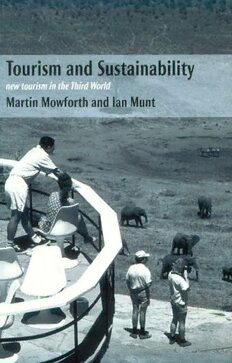
Tourism and Sustainability: New Tourism in the Third World PDF
382 Pages·1997·2.483 MB·English
Most books are stored in the elastic cloud where traffic is expensive. For this reason, we have a limit on daily download.
Preview Tourism and Sustainability: New Tourism in the Third World
Description:
Increasingly, advocates of tourism argue that tourism growth offers a means for Third World countries to escape the confines of 'underdevelopment' and that new forms of tourism in particular allow this transition to be achieved sustainably and equitably. Building upon this fundamental precept, this book explores and challenges the notions of sustainability, globalization and development, and their relationship to contemporary tourism in the Third World.Adopting a broad geographical and conceptual perspective, the authors contend that a clear understanding of the tourism process and its relationship to development can only be achieved by an interdisciplinary approach, touching on environmentalism, sociocultural studies, human geography, economics and development studies. In the first part of the book, the emergence of the concepts of sustainability, globalization and development, and their application to contemporary tourism are critically examined, whilst the second part of the book explores a number of critical themes. Developing the relationship between topics, from tourists and their relationships with new social movements to the impact of tourism policies adopted by national governments, this book examines a number of alternatives for the development of tourism in the Third World to progress.
See more
The list of books you might like
Most books are stored in the elastic cloud where traffic is expensive. For this reason, we have a limit on daily download.
